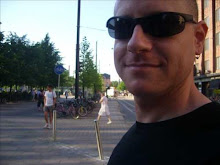There's an underlying sadness in the Triple-A All Star Game. Not because they're only one short step away from the big leagues; not because they're all minor league veterans the majority of whose time has come and gone; but because if many of them were given an opportunity to play in the big leagues as the 23rd to 25th man on the roster, they'd likely be able to help the big league team win a few games.
The game is still going on as I write this, but the players participating in the game are familiar----Mike Hessman, Willie Collazo, Jon Adkins, David Purcey----and have been on a big league/minor league shuttle for much of their recent careers. The ages vary from the mid-20s to early 30s and, unless lightning strikes somewhere, they are what they are as players. The worst part for many of them is that every big league team has interchangeable talents on the end of their benches or bullpens; interchangeable talents that the participants in the Triple-A All Star game could easily fill just as capably if given the opportunity, but most never do.
Hessman is a prime example of a player who has proven everything he needs to prove in the minor leagues. In thirteen seasons, he's hit 284 home runs (a "dubious honor" as Crash Davis said in Bull Durham). It's hard to believe that with the weakness of pitching in the big leagues today that Hessman wouldn't be able to provide at least 20 homers if he were given the opportunity, but he's 30 now and seen as a career minor leaguer who failed in his rare cups of coffee in the majors; he's been pigeonholed as a minor league cleanup guy who's useful for a brief fill-in when a big leaguer is injured, but nothing more.
Triple-A baseball is strangely devoid of legitimate prospects. There are veterans hanging on; journeymen hoping for an unlikely chance at the big leagues and sudden success; or guys making a living. If you want to see the true prospects, then the Futures Game is what you should watch; as for the Triple-A players, they're making a good salary for the minors, traveling in a bit better style than the lower minor league players do with the endless bus rides, and getting those brief chances to sit on the bench in the big leagues to make a fat paycheck for a couple of weeks and gain some service time; the lucky ones will contribute enough to a contender to get a post-season share.
The worst part is that there are numerous examples of players who were considered Triple-A All Stars, but non-prospects who finally received an opportunity and took advantage of it to cultivate a big league career. For every Heath Bell, Marcus Thames and Marco Scutaro----career minor leaguers who received a chance to play and carved a niche for themselves----there are players like Mike Hessman who would also produce something worthwhile if given the chance, but probably never will, so they're relegated to the status of Triple-A All Star when I'd bet they'd trade all their accomplishments in the minor leagues for the designation of big league backup if only for a year or two.
Subscribe to:
Post Comments (Atom)

No comments:
Post a Comment